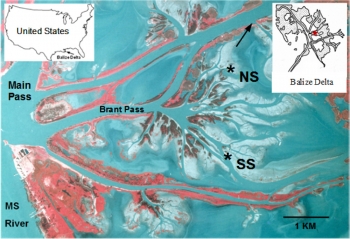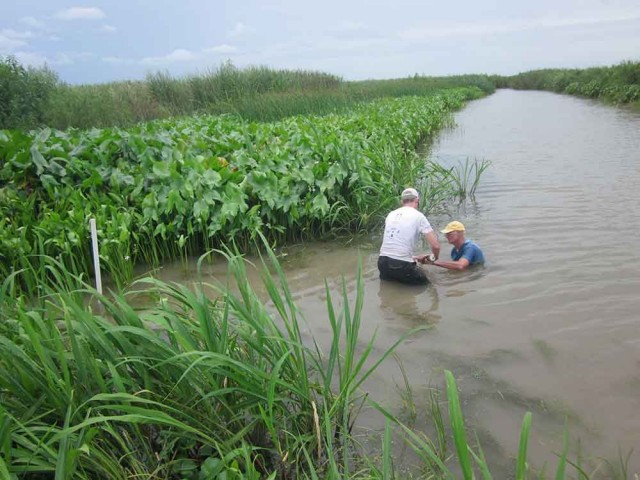
Dr. David White professor in the Environment Program and Biology department co-authored with Dr. Jenneke Visser from the University of Louisiana at Lafayette published a ground breaking study on the "Water quality change in the Mississippi River, including a warming river, explains decades of wetland plant biomass change within its Balize delta." Aquatic Botany 132 (2016) 5-11.
From 1988 to 2008 David A. White, Loyola University New Orleans Professor in Biological Sciences and the Environment Program, collected data hoping to determine what kind of impact things like temperature and sediment have on wetland biomass. Loyola press release - April 22, 2016.
Highlights
•Wetlands in the Mississippi River’s Balize Delta, USA showed an overall plant biomass increase with a large inter-annual change from 1988–2008.
•River discharge and sediment negatively impacted the biomass over these decades, whereas river temperature had a positive impact.
•The decadal plant biomass likely increased because of the impact of a 0.9 °C/decade increase in river temperature on growing season length.
•The added river temperature increased the growing season 0.7 days each year from 1983–2012, or 14.7 days over the shorter biomass study period.
•Climate change and land use/cover change in the catchment are likely responsible for the river and wetland biomass change in the Balize Delta.
These findings both inform environmental scientists of the impact of the world’s rivers on their respective wetlands—particularly those with deltas or large flood lands—and the effect humans are having on those wetlands.
“The results show that human impacts within river basins from land use change and climate change—in this case especially warming, but likely changes in discharge and sediment loads, too—are dramatically affecting wetland plant growth,” White explained.
More studies around the world are needed that seek to explain long-term variability in ecosystem properties.
“There is no doubt in an ecologist’s mind that there have been, are and will be cascading impacts through the ecosystems, food chains, nutrient cycling from changing river water qualities and thus plant growth,” White said. “Cascading changes in Louisiana wetlands will have subtle impacts on our seafood and recreational industries for those wildlife, fish, shellfish we harvest if we as a society don't react quicker than we are likely to do.”
Quite simply, “The more wetlands created in the state, the better,” David White. 
Abstract
Ecosystem properties of riverine wetlands are known for high inter-annual variability. This multi-decadal study within the wetland complex of the Mississippi River’s Balize Delta, USA assesses how river parameters (temperature, discharge, and sediment load) impact wetland plant biomass over time and space. The Mississippi River’s annual temperature has increased 0.9 °C/decade, while discharge and sediment load has varied without trend over the same period. End-of-season herbaceous biomass increased 14 g/m2/year between 1988 and 2008, extrapolating to large (m-ton) area-wide increases. The river’s temperature, discharge and sediment impacted the Delta’s biomass in two ways: the increase in temperature had a positive impact on the growing season length which increased biomass; whereas discharge and load had negative impacts affecting the inter-annual variation without a temporal trend. The results explain natural variability in ecosystem processes in a dynamic deltaic system and likely trace a signal related to both climate warming and land use change within the drainage of the Mississippi River. The discovered decadal increase in herbaceous biomass has implications on carbon storage in the inshore and offshore receiving basins of the world’s riverine wetlands experiencing longer growing seasons.
The Advocate
by Amy Wold on April 25, 2016
Study: Warming Mississippi River water at its delta is extending growing season for grass on new land
Global climate change has helped warm the waters of the Mississippi River and, as a result, extend the growing season along the delta by more than two weeks longer than in 1983, according to a newly published study from Louisiana researchers Drs. White and Visser.
Click here to read the Loyola press release.
